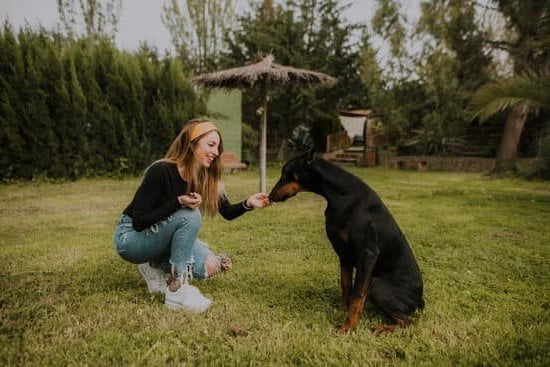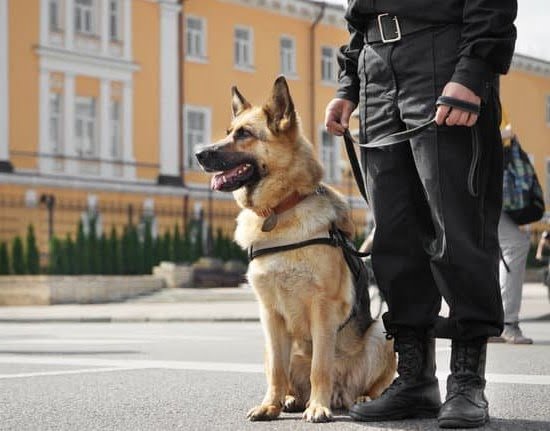Can older dogs be trained? This question has been a topic of debate among dog owners and trainers for years. In this article, we will explore the misconceptions about training older dogs and shed light on the truth behind their ability to learn new behaviors. Many people believe that older dogs are set in their ways and cannot be taught new tricks, but we will debunk these myths and uncover the potential for training older dogs.
As pet owners, it is important to understand the limitations and challenges of training older dogs. We will take a closer look at the factors that may affect an older dog’s ability to learn, as well as the specific methods that can be used to successfully train them. By gaining a better understanding of these obstacles, we can develop tailored training techniques that cater to the unique needs of older dogs.
Despite common misconceptions, there are numerous benefits to training older dogs that often go unrecognized. We will challenge these myths and highlight the ways in which training can improve an older dog’s quality of life. Additionally, we will discuss the importance of patience and consistency when working with older dogs, as well as positive reinforcement techniques that have been proven effective in their training.
Understanding the Limitations and Challenges of Training Older Dogs
Older dogs, just like older humans, may face limitations and challenges when it comes to learning new behaviors and tricks. It is important for dog owners to understand these limitations in order to set realistic expectations for training their older furry companions.
One of the main limitations of training older dogs is their physical condition. As dogs age, they may experience joint pain, arthritis, or other health issues that can make certain training activities difficult or even painful for them. Additionally, older dogs may not have the same level of energy and stamina as younger dogs, which can affect their ability to engage in long training sessions.
Another challenge when training older dogs is their established habits and behaviors. Older dogs may have spent many years practicing certain behaviors, whether they are desirable or not, and breaking these habits can be more challenging than teaching a blank slate puppy. It requires patience, consistency, and understanding from the owner to help an older dog unlearn old behaviors and adopt new ones.
Despite these limitations and challenges, it is important to note that older dogs can be trained. With the right approach, tailored training methods, patience, and positive reinforcement techniques, older dogs can learn new tricks and behaviors. It is essential for dog owners to recognize the potential in their older pets and invest the time and effort into helping them learn and adapt.
Benefits of Training Older Dogs
As our furry companions age, there is a common misconception that they are unable to learn new behaviors or tricks. However, the truth is that older dogs can be trained just as effectively as younger ones, it may just take a little more time and patience. In fact, there are numerous benefits to training older dogs that often go overlooked.
Development of Mental Stimulation
Many people believe that older dogs are set in their ways and cannot learn new things. However, training an older dog can actually provide them with mental stimulation and prevent cognitive decline. Just like humans, dogs need mental exercise to keep their minds sharp as they age. Introducing new training methods and commands can help keep their brain engaged and improve overall mental health.
Bonding and Socialization
Training an older dog provides an opportunity for bonding and socialization between the dog and their owner or trainer. It allows for quality one-on-one time, which can strengthen the bond between human and dog. Additionally, practicing obedience commands in different environments can help older dogs become more socialized and better behaved in various situations.
Improved Behavior and Overall Well-Being
Contrary to popular belief, training an older dog
Overall, the benefits of training older dogs extend far beyond learning new tricks. From mental stimulation to improved behavior, debunking the myths about training older dogs opens up a world of possibilities for both the dog and its owner.
Tailoring Training Methods for Older Dogs
When it comes to training older dogs, it is important to understand that they have different needs and limitations compared to younger dogs. Tailoring training methods for older dogs is essential in ensuring that they can still learn new behaviors and tricks despite their age.
One important consideration when training older dogs is their physical health. As dogs age, they may develop mobility issues or arthritis, which can affect their ability to perform certain tasks. It’s important to take these physical limitations into account when designing a training program for an older dog. For example, if an older dog has joint pain, activities that put stress on the joints should be avoided.
Another important aspect of tailoring training methods for older dogs is understanding their behavioral patterns. Older dogs may have ingrained behaviors that are more difficult to change compared to younger dogs. However, with the right approach and patience, these behaviors can still be modified through consistent training techniques.
It’s also important to consider the cognitive abilities of older dogs when designing a training program. Just like humans, older dogs may experience cognitive decline as they age. This means that training sessions may need to be shorter and more frequent, with a focus on positive reinforcement techniques to keep the dog engaged and motivated.
| Aspect | Consideration |
|---|---|
| Physical Health | Avoid activities that put stress on the joints |
| Behavioral Patterns | Modify behaviors through consistent training techniques |
| Cognitive Abilities | Shorter and more frequent training sessions with positive reinforcement techniques |
Patience and Consistency
When it comes to training older dogs, patience and consistency are key factors in achieving success. Many people believe that older dogs cannot be trained due to their age and established habits, but with the right approach, it is possible to teach an old dog new tricks.
Understanding the Needs of Older Dogs
Older dogs may have physical limitations such as arthritis or decreased mobility, which can affect their ability to learn new behaviors. It’s important for trainers to take these limitations into consideration and tailor their training methods accordingly. Additionally, older dogs may have a longer history of ingrained behaviors, making it necessary for trainers to be patient and understanding during the training process.
Consistency in Training
Consistency is crucial when it comes to training older dogs. By establishing a routine and consistently reinforcing desired behaviors, older dogs can learn and adapt to new commands. It’s important for trainers to be patient and persistent, as it may take longer for older dogs to understand and obey commands compared to younger dogs.
Positive Reinforcement
Using positive reinforcement techniques, such as treats and praise, can be highly effective in training older dogs. Rewarding good behavior encourages them to repeat the desired actions, making the training process more successful. It’s important for trainers to focus on rewarding positive behaviors rather than punishing unwanted behaviors in order to create a positive learning environment for older dogs.
With patience, consistency, and the right approach, older dogs
Positive Reinforcement Techniques for Older Dogs
When it comes to training older dogs, positive reinforcement techniques can be incredibly effective in encouraging desired behaviors. Here are some key positive reinforcement techniques that can be used to train older dogs:
- Use of treats: Offering a treat as a reward for good behavior is a simple yet powerful form of positive reinforcement. This can help older dogs associate the desired behavior with something enjoyable, making them more likely to repeat it.
- Clicker training: Clicker training involves using a small device that makes a clicking sound to mark the moment when your dog performs the correct behavior. This technique helps older dogs understand exactly what they are being rewarded for.
- Verbal praise: Older dogs respond well to verbal praise and encouragement. By using a cheerful tone and showering them with praise when they exhibit the desired behavior, you can reinforce their actions and motivate them to continue behaving in the same way.
It’s important to note that while positive reinforcement techniques are highly effective, they do require patience and consistency. Training an older dog takes time and dedication, but by utilizing these methods, it is possible to encourage and reinforce positive behaviors in senior canine companions.
Moreover, it’s crucial to customize the training approach based on the individual needs and capabilities of each older dog. What works for one dog may not necessarily work for another, so tailoring the training methods to suit their specific requirements is essential in ensuring success.
Remember that old age is not a barrier to learning for dogs – with patience, consistency, and the right techniques, older dogs can absolutely be trained effectively.
Overcoming Behavioral Issues Through Training
Older dogs may have developed certain behavioral issues over the years, which can make training more challenging. However, it is important to understand that with patience, consistency, and the right approach, many of these issues can be addressed through training.
One common issue among older dogs is separation anxiety. This can manifest in behaviors such as excessive barking, destructive chewing, or soiling the house when left alone. Through training and desensitization techniques, older dogs can learn to cope with being alone and exhibit more calm and relaxed behavior when their owners are away.
Aggression is another issue that some older dogs may struggle with. Whether it’s directed towards people or other animals, aggressive behavior can be modified through proper training Techniques such as counter conditioning and desensitization under the guidance of a professional trainer or behaviorist can help older dogs learn new, non-aggressive responses to potentially triggering situations.
It’s important to note that while older dogs may have ingrained behaviors, they are still capable of learning new ways of behaving through consistent and positive training methods. With the right approach, many behavioral issues in older dogs can be successfully overcome through training.
| Behavioral Issue | Training Technique |
|---|---|
| Separation Anxiety | Desensitization Techniques |
| Aggression | Counter Conditioning and Desensitization |
Success Stories
Training older dogs may present its own unique set of challenges, but it is not impossible. In fact, many older dogs have successfully learned new behaviors and tricks through proper training techniques and consistency. Here are some real-life examples of older dogs that have been successfully trained:
- Max, a 10-year-old Labrador Retriever, was able to learn how to walk nicely on a leash and respond to basic commands such as sit, stay, and come. With the right approach and plenty of patience from his owner, Max was able to overcome his previous stubbornness and reluctance to follow commands.
- Molly, an 8-year-old rescue dog with a history of aggressive behavior towards other animals, was able to undergo behavior modification training with the help of a professional trainer. Through positive reinforcement techniques and consistent practice, Molly learned how to coexist peacefully with other pets in her household.
- Buddy, a 12-year-old mixed breed dog, had developed separation anxiety in his old age. His owners worked diligently with a certified dog trainer to address this issue through desensitization exercises and creating a comforting routine for Buddy when they were away. Over time, Buddy showed significant improvement in managing his anxiety when left alone.
These success stories serve as evidence that older dogs can indeed be trained effectively with the right approach and dedication from their owners. With the proper methods and strategies, even senior dogs can learn new behaviors and overcome behavioral issues. It is important for dog owners to understand that age should not be a barrier to training and shaping their pet’s behavior positively.
Conclusion
In conclusion, the idea that older dogs can’t be trained is simply a misconception. While it may present some challenges, training older dogs is definitely possible and can be incredibly rewarding. By understanding their limitations and tailoring training methods to suit their needs, older dogs can learn new tricks and behaviors just as effectively as younger ones.
It’s important to remember that patience and consistency are key factors in successfully training older dogs. With a gentle approach and positive reinforcement techniques, older dogs can overcome behavioral issues and develop new skills. Many success stories exist of older dogs being trained to perform tasks or behaviors that were previously thought impossible for them.
Ultimately, the potential for older dogs to learn new tricks and behaviors should not be underestimated. With the right approach and commitment, older dogs can be trained just as effectively as their younger counterparts. It’s never too late for an old dog to learn something new, and with the right guidance, they can surprise us with their ability to adapt and thrive through training.
Frequently Asked Questions
What Is the Oldest Age a Dog Can Be Trained?
The oldest age a dog can be trained depends on the individual dog’s health and cognitive abilities. Some senior dogs can still learn new commands and behaviors, while others may struggle due to age-related limitations.
Is It Too Late to Train a Senior Dog?
It is not necessarily too late to train a senior dog, as they can still learn new things with patience and consistency. However, the training approach may need to be adjusted to accommodate any physical or cognitive limitations the older dog may have.
Is It Harder to Train Older Dogs?
Training older dogs can be more challenging in some cases due to potential age-related issues such as decreased mobility or loss of hearing or vision. However, with the right techniques and understanding of the dog’s capabilities, it is still possible to successfully train an older dog.

Welcome to the blog! I am a professional dog trainer and have been working with dogs for many years. In this blog, I will be discussing various topics related to dog training, including tips, tricks, and advice. I hope you find this information helpful and informative. Thanks for reading!





